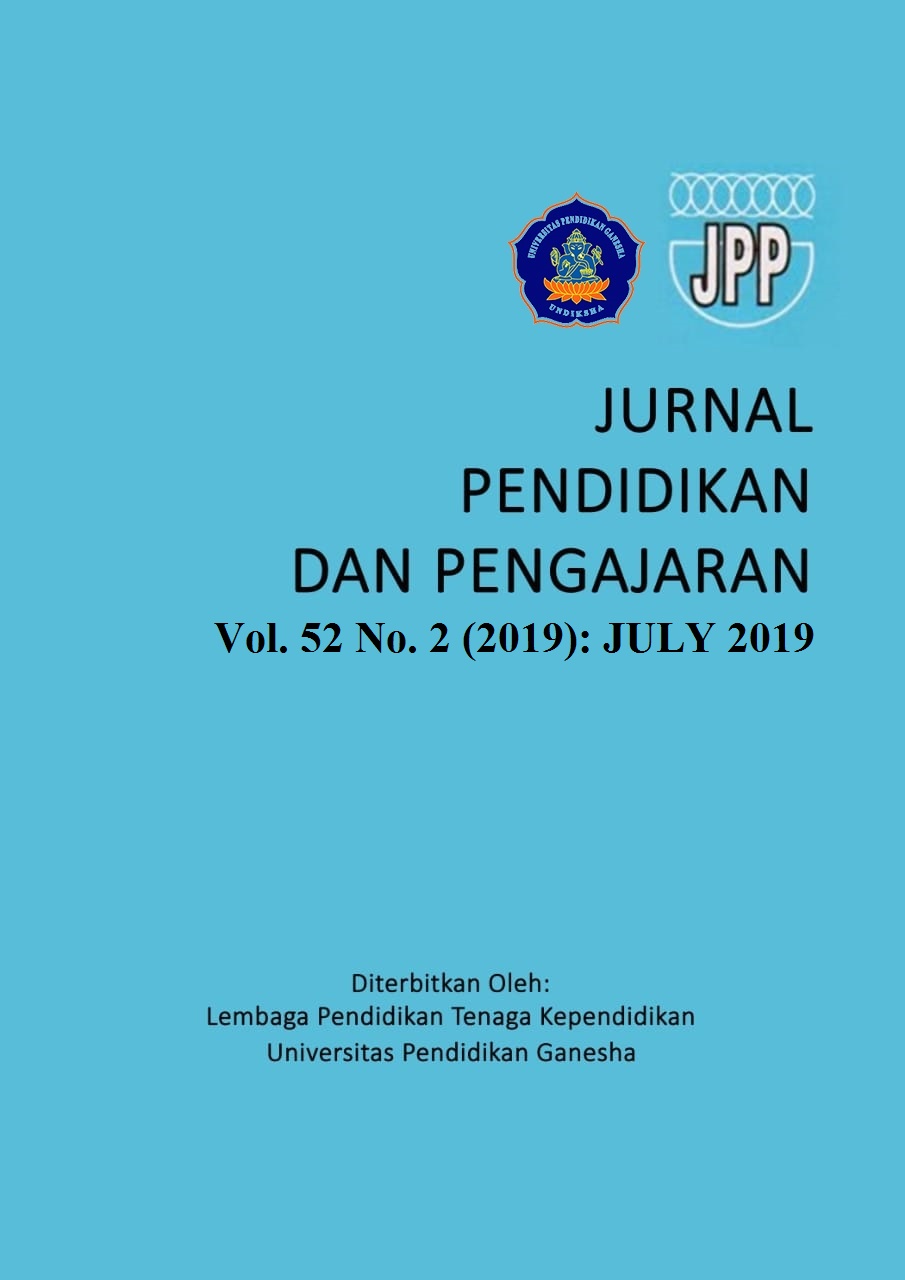Entrepreneurship laboratory-based learning to increase students' interest in entrepreneurship
DOI:
https://doi.org/10.23887/jpp.v52i2.17866Keywords:
laboratory of entrepreneurship, students’ interest, UNY PlazaAbstract
The aim of this study was to determine the effect of entrepreneurship laboratories (UNY Plaza) on the students’ interest. The research was conducted at the Faculty of Economics, Universitas Negeri Yogyakarta. The questionnaire was used as a data collection tool distributed to 240 respondents. The results showed that the value of t count of 3.489 and t table of 1.6 means tcount > ttable. Then this study succeeded in proving the hypothesis which states that the UNY Plaza entrepreneurial laboratory has a positive effect on the interest of entrepreneurial students of the Faculty of Economics, University of Yogyakarta. Based on the analysis results, 29.6 percent of students' interest in entrepreneurship is explained by entrepreneurial laboratory variables, while 70.4 percent are explained by other factors that are not the focus of research.
References
Achmad, N., & Putra, R. D. (2017). Faktor-Faktor yang Memotivasi Minat Mahasiswa dalam Berwirausaha Setelah Mendapatkan Materi KWU.
Alimudin, A. (2015). Strategi pengembangan minat wirausaha melalui proses pembelajaran. E-Jurnal Manajemen Kinerja, 1(1), 1–13.
Blenker, P., Elmholdt, S. T., Frederiksen, S. H., Korsgaard, S., Wagner, K., Trolle Elmholdt, S., … Wagner, K. (2014). Methods in entrepreneurship education research: a review and integrative framework. Education Training, 56(8/9), 697–715. https://doi.org/10.1108/ET-06-2014-0066
Desai, S. (2011). Measuring entrepreneurship in developing countries. Entrepreneurship and Economic Development, 94–107.
Desy, A. (2001). Kamus Lengkap Bahasa Indonesia. Surabaya: Penerbit Karya Abditama.
Graevenitz, G. Von, Harhoff, D., Weber, R., Graevenitz, G. Von, Harhoff, D., Weber, R., … Weber, R. (2010). The Effects of Entrepreneurship Education. Journal of Economic Behavior and Organization, 76(1), 90–112. https://doi.org/10.1016/j.jebo.2010.02.015
Hasbi, H., & Arda, A. (2016). Kontribusi Pengalaman Prakerin dan Bimbingan Karir terhadap Minat Berwirausaha Siswa SMK di Malang. Prosiding, 2(1).
Hermina, U. N., Novieyana, S., & Zain, D. (2013). Pengaruh mata kuliah kewirausahaan terhadap minat mahasiswa menjadi wirausaha pada program studi administrasi bisnis Politeknik Negeri Pontianak.
Hytti, U., Stenholm, P., Heinonen, J., & Seikkula-Leino, J. (2010). Perceived Learning Outcomes in Entrepreneurship Education: The Impact of Student Motivation and Team Behaviour. Education & Training, 52(November), 587–606. https://doi.org/10.1108/00400911011088935
Kuratko, D. F., Morris, M. H., & Schindehutte, M. (2015). Understanding the dynamics of entrepreneurship through framework approaches. Small Business Economics, 45(1), 1–13. https://doi.org/10.1007/s11187-015-9627-3
Kurniawan, R. (2014). Pengaruh Penerapan Model Pembelajaran Teaching Factory 6 Langkah (TF-6M) dan Prestasi Belajar kewirausahaan Terhadap Minat Wirausaha. Innovation of Vocational Technology Education, 10(1).
Küttim, M., Kallaste, M., Venesaar, U., & Kiis, A. (2014). Entrepreneurship education at university level and students ’ entrepreneurial intentions. Procedia - Social and Behavioral Sciences, 110, 658–668. https://doi.org/10.1016/j.sbspro.2013.12.910
Mason, C. (2014). Entrepreneurship Education And Research : Emerging Trends And Concerns. Journal of Global Entrepreneurship, 1(1), 13–25.
Muzawir, M., Wahjoedi, W., & Witjaksono, M. (2017). Peran Keberadaan Koperasi Siswa sebagai Laboratorium Belajar Ekonomi. Jurnal Pendidikan: Teori, Penelitian, Dan Pengembangan, 2(2), 166–172.
Neck, H. M., & Corbett, A. C. (2018). The Scholarship of Teaching and Learning Entrepreneurship. Entrepreneurship Education and Pedagogy, 1(1), 8–41. https://doi.org/10.1177/2515127417737286
Prasetyo, I. (2009). Membangun Karakter Wirausaha Melalui Pendidikan Berbasis Nilai Dalam Program Pendidikan Non Formal. Jurnal PNFI, 1(1), 1–12.
Raposo, M., & Paço, A. do. (2011). Entrepreneurship education: Relationship between education. Psicothema, 23(3), 453–457.
Slameto. (2003). Belajar Faktor-faktor Yang Mempengaruhinya. Jakarta: Bina Aksara.
Sulistyowati, E. E., Utomo, S. H., & Sugeng, B. (2016). Pengaruh pendidikan kewirausahaan di lingkungan keluarga, pembelajaran kewirausahaan di sekolah, serta achievement motive terhadap minat kewirausahaan siswa sma. Jurnal Pendidikan: Teori, Penelitian, Dan Pengembangan, 1(11), 2226–2229.
Syaifudin, A., & Sagoro, E. M. (2017). Pengaruh Kepribadian, Lingkungan Keluarga dan Pendidikan Kewirausahaan Terhadap Minat Berwirausaha Mahasiswa Akuntansi. Jurnal Profita: Kajian Ilmu Akuntansi, 5(8).
Wibowo, M. (2012). Pembelajaran kewirausahaan dan minat wirausaha lulusan SMK. Eksplanasi, 6(2).
Yusuf, M., Natsir, S., & Kornelius, Y. (2017). Pengaruh Kepribadian dan Lingkungan Keluarga terhadap Minat Berwirausaha Mahasiswa Manajemen Fakultas Ekonomi Universitas Tadulako. Jurnal Ilmu Manajemen Universitas Tadulako, 3(1), 244–258.
Downloads
Published
How to Cite
Issue
Section
License
Authors who publish with Jurnal Pendidikan dan Pengajaran agree to the following terms:- Authors retain copyright and grant the journal the right of first publication with the work simultaneously licensed under a Creative Commons Attribution License (CC BY-SA 4.0) that allows others to share the work with an acknowledgment of the work's authorship and initial publication in this journal
- Authors are able to enter into separate, additional contractual arrangements for the non-exclusive distribution of the journal's published version of the work (e.g., post it to an institutional repository or publish it in a book), with an acknowledgment of its initial publication in this journal.
- Authors are permitted and encouraged to post their work online (e.g., in institutional repositories or on their website) prior to and during the submission process, as it can lead to productive exchanges, as well as earlier and greater citation of published work. (See The Effect of Open Access)





